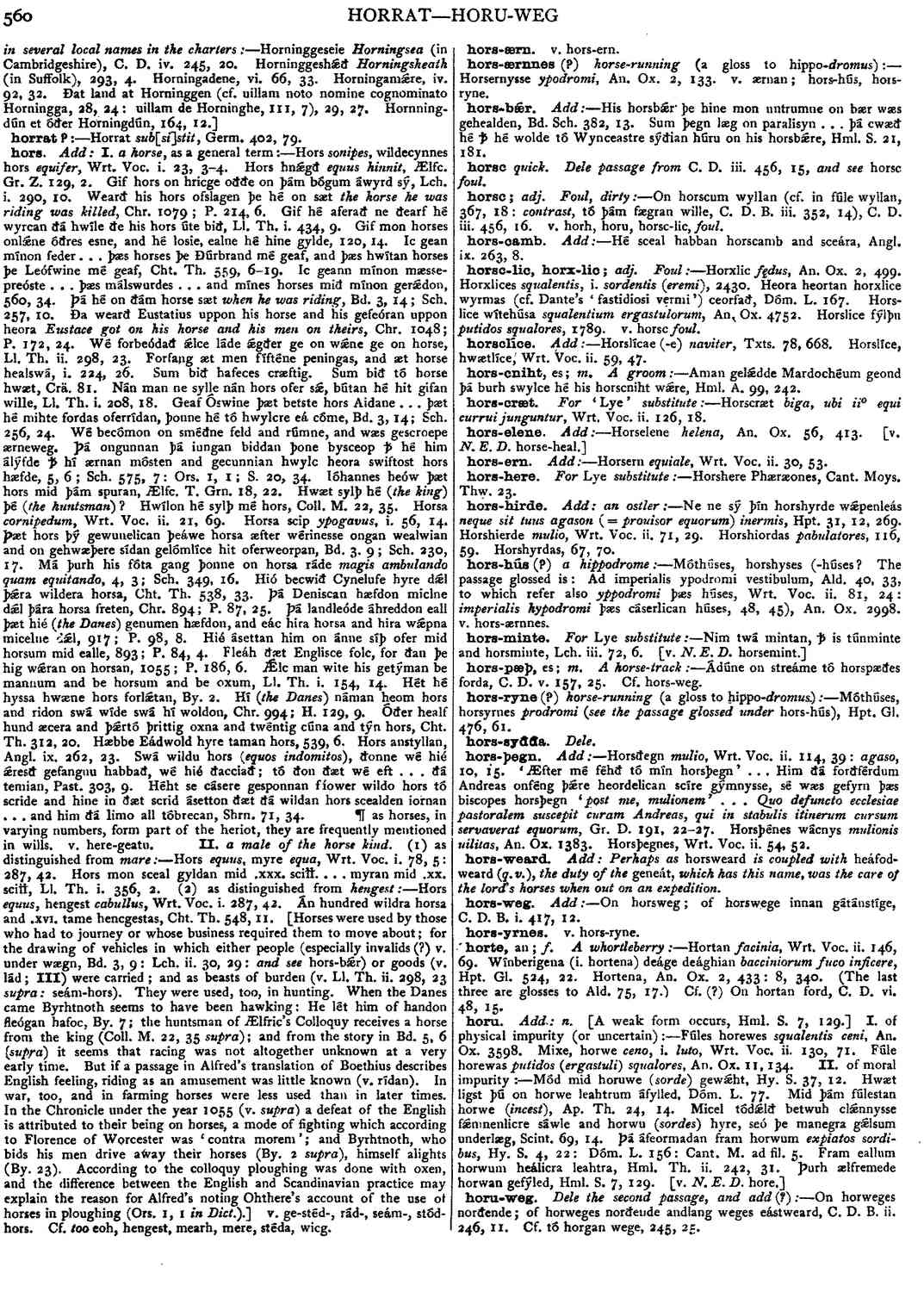hors
-
Hors sonipes, wildecynnes hors
equifer,
- Wrt. Voc. i. 23, 3-4.
-
Hors hnǽgð
equus hinnit,
- Ælfc. Gr. Z. 129, 2.
-
Gif hors on hricge oððe on þám bógum áwyrd sý,
- Lch. i. 290, 10.
-
Wearð his hors ofslagen þe hé on sæt
the horse he was riding was killed,
- Chr. 1079; P. 214, 6.
-
Gif hé aferað ne ðearf hé wyrcan ðá hwíle ðe his hors úte bið,
- Ll. Th. i. 434, 9.
-
Gif mon horses onlǽne óðres esne, and hé losie, ealne hé hine gylde,
- 120, 14.
-
Ic gean mínon feder . . . þæs horses þe Ðúrbrand mé geaf, and þæs hwítan horses þe Leófwine mé geaf,
- Cht. Th. 559, 6-19.
-
Ic geann mínon mæssepreóste . . . þæs málswurdes . . . and mínes horses mið mínon gerǽdon,
- 560, 34.
-
Þá hé on ðám horse sæt
when he was riding,
- Bd. 3, 14; Sch. 257, 10.
-
Ða wearð Eustatius uppon his horse and his gefeóran uppon heora
Eustace got on his horse and his men on theirs,
- Chr. 1048; P. 172, 24.
-
Wé forbeódað ǽlce láde ǽgðer ge on wǽne ge on horse,
- Ll. Th. ii. 298, 23.
- Forfang æt men fífténe peningas, and æt horse healswá, i. 224, 26.
-
Sum bið hafeces cræftig. Sum bið tó horse hwæt,
- Crä. 81.
-
Nán man ne sylle nán hors ofer sǽ, bútan hé hit gifan wille,
- Ll. Th. i. 208, 18.
-
Geaf Óswine þæt betste hors Aidane . . . þæt hé mihte fordas oferrídan, þonne hé tó hwylcre eá come,
- Bd. 3, 14; Sch. 256, 24.
-
Wé becómon on sméðne feld and rúmne, and wæs gescroepe ærneweg. Þá ongunnan þá iungan biddan þone bysceop ꝥ hé him álýfde ꝥ hí ærnan mósten and gecunnian hwylc heora swiftost hors hæfde,
- 5, 6; Sch. 575, 7: Ors. 1, 1; S. 20, 34.
-
Ióhannes heów þæt hors mid þám spuran,
- Ælfc. T. Grn. 18, 22.
-
Hwæt sylþ hé (
the king) þé (the huntsman )
? Hwílon hé sylþ mé hors,- Coll. M. 22, 35.
-
Horsa
cornipedum,
- Wrt. Voc. ii. 21, 69.
-
Horsa scip
ypogavus,
i.- 56, 14.
-
Þæt hors þý gewunelican þeáwe horsa æfter wérinesse ongan wealwian and on gehwæþere sídan gelómlíce hit oferweorpan,
- Bd. 3. 9; Sch. 230, 17.
-
Má þurh his fóta gang þonne on horsa ráde
magis ambulando quam equitando,
- 4, 3; Sch. 349, 16.
-
Hió becwið Cynelufe hyre dǽl þǽra wildera horsa,
- Cht. Th. 538, 33.
-
Þá Deniscan hæfdon miclne dǽl þára horsa freten,
- Chr. 894; P. 87, 25.
-
Þá landleóde áhreddon eall þæt hié (
the Danes
) genumen hæfdon, and eác hira horsa and hira wǽpna micelne dǽl,- 917; P. 98, 8.
-
Hié ásettan him on ánne síþ ofer mid horsum mid ealle,
- 893; P. 84, 4.
-
Fleáh ðæt Englisce folc, for ðan þe hig wǽran on horsan,
- 1055; P. 186, 6.
-
Ǽlc man wite his getýman be mannum and be horsum and be oxum,
- Ll. Th. i. 154, 14.
-
Hét hé hyssa hwæne hors forlǽtan,
- By. 2.
-
Hí (
the Danes
) náman heom hors and ridon swá wíde swá hí woldon,- Chr. 994; H. 129, 9.
-
Óðer healf hund æcera and þǽrtó þrittig oxna and twéntig cúna and týn hors,
- Cht. Th. 312, 20.
-
Hæbbe Eádwold hyre taman hors,
- 539, 6.
-
Hors anstyllan,
- Angl. ix. 262, 23.
-
Swá wildu hors (
equos indomitos
), ðonne wé hié ǽresð gefangnu habbað, wé hié ðacciað; tó ðon ðæt wé eft . . . ðá temian,- Past. 303, 9.
-
Héht se cásere gesponnan fíower wildo hors tó scride and hine in ðæt scrid ásetton ðæt ðá wildan hors scealden iornan . . . and him ðá limo all tóbrecan,
- Shrn. 71, 34. ¶ as horses, in varying numbers, form part of the heriot, they are frequently mentioned in wills. v. here-geatu.
-
Hors equus, myre
equa,
- Wrt. Voc. i. 78, 5: 287, 42.
-
Hors mon sceal gyldan mid .xxx. sciłł. . . . myran mid .xx. sciłł,
- Ll. Th. i. 356, 2.
-
Hors equus, hengest
cabullus,
- Wrt. Voc. i. 287, 42.
-
Án hundred wildra horsa and . xvi. tame hencgestas,
- Cht. Th. 548, 11.
Bosworth, Joseph. “hors.” In An Anglo-Saxon Dictionary Online, edited by Thomas Northcote Toller, Christ Sean, and Ondřej Tichy. Prague: Faculty of Arts, Charles University, 2014. https://bosworthtoller.com/53022.
Checked: 0